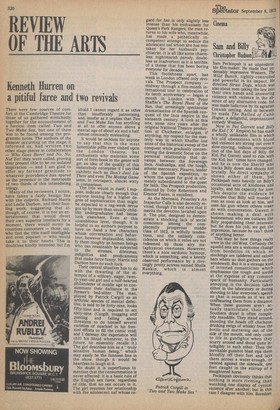32 1iEVIEW
OF THE ARTS
Kenneth Hurren on a pitiful farce and two revivals
There were few sources of comfort at the Cambridge Theatre for those of us gathered wretchedly together for the accouchement of a farcical item called Two and Two Make Sex, but one of them was to be found among the programme notes. The authors of the disaster occurring on the stage, it informed us, had written two other stage pieces in collaboration — Who Goes Bare? and No, No, Not WV they were called, proving their present title to be no isolated inspiration — and I am glad to offer my fervent gratitude to .whatever providence has spared us the presence in the metropolis of two thirds of this intimidating trilogy.
Many of the reviewers, I notice, have taken a fairly benign line with the culprits, Richard Harris and Leslie Darbon, and their footling work, suggesting that although, of course, it is not an entertainment that would divert their own superior intellects for a moment, there would surely be countless customers — those, say, who find the title itself intelligible and even piquant — who would take it to their hearts. This is doubtless kindly intended, but I'm
afraid I cannot regard it as other than insufferably patronising, mid, insofar as it implies that Two and Two Make Sex has anything at all to offer anyone above a mental age of about six and a half,
almost criminally misleading. ,
It would be reckless for anyone to say that this is the most lamentable piffle ever visited upon the London theatre, but enthusiasts who maintain some sort of form-book in the genre will get an idea of the quality of this melancholy enterprise if I say that exhibits such as Don't Just Lie There and even The Mating Game seem, in retrospect, almost witty in comparison.
The title would in itself, I suppose, indicate clearly enough that anyone looking for a higher degree of sophistication than might be expected in a rag-week revue got up by more than usually childlike undergraduates had better look elsewhere. Even at this unambitious level, though, it is helpful to an author's purpose to have on hand a few characters whose conversation and behaviour, however implausible, identify them roughly as human beings who can reasonably be subjected to the stresses, dilemmas, indignities and predicaments that make farce funny. Harris and Darbon have no such luck.
Their central situation has to do with the thwarting of the attempts of a willowy, eager, twenty-year-old girl and a half-hearted .philanderer of middle age to consummate their dalliance in the former's bed-sitter. The man, played by Patrick Cargill as an arthritic species of mental defective, is said to be forty-nine, looks fifty-nine and is required to act sixty-nine. (Cargill, mugging and panting and falling about threatens to do himself several varieties of mischief in his frenzied efforts to fill the comic void; and I daresay the experience will chill his blood whenever, in the future, he miserably recalls it.) The girl describes him as a "truly sensitive human being," which may easily be the funniest line in the show, though it would be heartless to laugh at it.
No cbubt it is superfluous to mention that the consummation is never effected: it is a basic rule of the English sex farce, regardless of title, that no sex occurs in it. The girl resumes her relationship with the adolescent oaf whose re gard for her is only slightly less intense than his enthusiasm for Queen's Park Rangers; the man returns to his wife who, meanwhile, has made a pathetically incompetent attempt to seduce the adolescent oaf whom she has mistaken for her husband's psychiatrist. It is all like some charmless, nightmarish parody, doubtless as inadvertent as it is terrible, of a theme that has been boring everyone for decades.
• This foolishness apart, last week in London offered only revivals. The Prospect company — midway through a five-month international tour in celebration of its tenth anniversary — began a month in London with Peter Shaffer's The Royal Hunt of the Sun, that arrestingly spectacular dramatisation of the Spanish conquest of the Inca empire in the sixteenth century. A look at this one, some nine years after the original National Theatre production at Chichester, enlarges, if anything, my respect for the masterly way in which Shaffer lost none of the historical sweep of the conquest while gradually concentrating the dramatic focus on the personal relationship that develops between the Sovereign Inca, Atahuallpa, and the tough, atheist mercenary, Pizarro, leader of the Spanish expedition, to whom the quest for gold is ultimately subordinated to the quest for faith. The Prospect production, directed by Toby Robertson and Eleanor Fazan, is excellent.
At the Mermaid, Priestley's An Inspector Calls is also decently revived, though I'm not sure that it merits the devotion lavished upon it. The plot, designed to demonstrate a shocking lack of social conscience among the complacently prosperous middle class of 1912, is wilfully tendentious, and the unlikely coincidences on which it relies are not redeemed by those airy metaphysical overtones. However, there's a nice sardonic humour, which is something, and a keenly observed performance by a rivetingly pretty actress named Sheila Ruskin, which is almost everything.


































 Previous page
Previous page